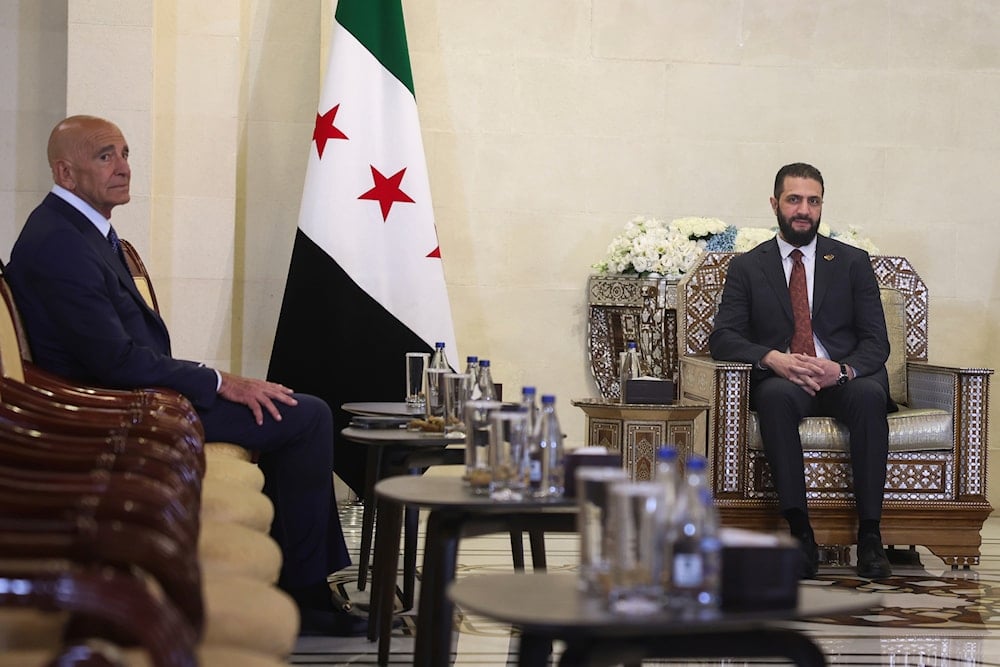Syria, now buffer zone, places 'Israel' on Iraqi border: IOF colonel
Commenting on talks between Syrian and Israeli officials in Azerbaijan, Israeli media say it is not surprising, emphasizing that this encounter is neither the first nor the last of its kind.
-

Syria's interim president, Ahmad al-Sharaa, right, meets with US Ambassador to Turkey and Special Envoy to Syria Tom Barrack at the People's Palace in Damascus, Syria, on Wednesday, July 9, 2025 (AP)
In a quiet but significant diplomatic development, Syria and "Israel" have resumed direct and indirect talks with a recent meeting reportedly held in Azerbaijan involving top security officials from both sides discussing regional stability.
The Israeli channel Kan noted that the holding of a meeting between Syrian and Israeli officials in Azerbaijan is not surprising, emphasizing that this encounter is neither the first nor the last of its kind.
The channel explained that direct and indirect talks and dialogue between Syria and "Israel" have previously taken place under US sponsorship.
The channel reported that Azerbaijan recently hosted talks between Israeli officials, including "National Security" Council head Tzachi Hanegbi, and representatives of the Turkish military.
Direct communications with no mediators
Kan also revealed that members of the Israeli Knesset's Foreign Affairs and Security Committee were informed about direct communications with Syria, without any mediation. Knesset members were told "Israel" insisted Syria stop attacks on the Druze immediately, calling it a top priority and a condition for continuing security talks.
Meanwhile, Reserve Colonel Jacques Neriah of the Israeli military told Channel 12 on Friday that "discussions are underway with Syria, apparently hovering between a non-aggression understanding and a potential new security agreement."
Neriah added that "Israel's National Security" Council head represents the Israeli side in these talks, while Syria's Defense Minister Maher Abu Qasra leads the delegation from Damascus, noting that "Israel" is deeply invested in settling with Syria.
Syria turned into buffer zone with Iran
Neriah, a former advisor to the Israeli prime minister, argued that "Israel" has effectively "pushed Iran's borders away" by leveraging Syria's anti-Tehran regime, achieving this strategic goal without direct intervention after Iran had, in his words, "attempted to move its borders closer to the Golan."
He went on, "Now our border effectively stretches toward Iraq, since Syria acts as a buffer between us and Iran," emphasizing that "this is critically important and fundamentally reshapes the entire regional equation."
It should be noted that Jacques Neriah, who is of Lebanese descent, served as an advisor to former Israeli Prime Minister Yitzhak Rabin and previously held a position in "Israel's" military intelligence division, Aman.
Meeting in Baku meant to send a message to Iran
On the meetings in Baku, Israeli media outlet i24NEWS reported that part two or three sessions occurred, reportedly including Syrian Foreign Minister Asaad al-Shaibani and Ahmad al-Dalati, the Syrian government's liaison responsible for security coordination with "Israel". On the Israeli side, the delegation included a special envoy from Prime Minister Benjamin Netanyahu, along with senior military and security officials.
What was discussed?
The discussions focused on finalizing a security agreement between the two governments, addressing regional issues such as what was described as Iranian presence in Syria and Lebanon, as well as Hezbollah's military arsenal and the armament of Palestinian Resistance factions.
The future of Palestinian refugee camps in Lebanon and the fate of displaced Palestinians from Gaza were also reportedly on the agenda.
Potential establishment of Israeli coordination office
One proposal under consideration is the establishment of an Israeli "coordination office" in Damascus, albeit without formal diplomatic status. This move would represent a significant shift in Syria's long-standing policy of non-engagement with "Israel" and support to resistance groups in the region.
The decision to hold the meetings in Azerbaijan, reportedly orchestrated by "Israel" and the United States, was aimed at sending a direct message to Iran amid escalating regional tensions.
Read more: Barrack defends Syria comments, claims they are no threat to Lebanon

 4 Min Read
4 Min Read










